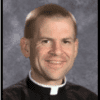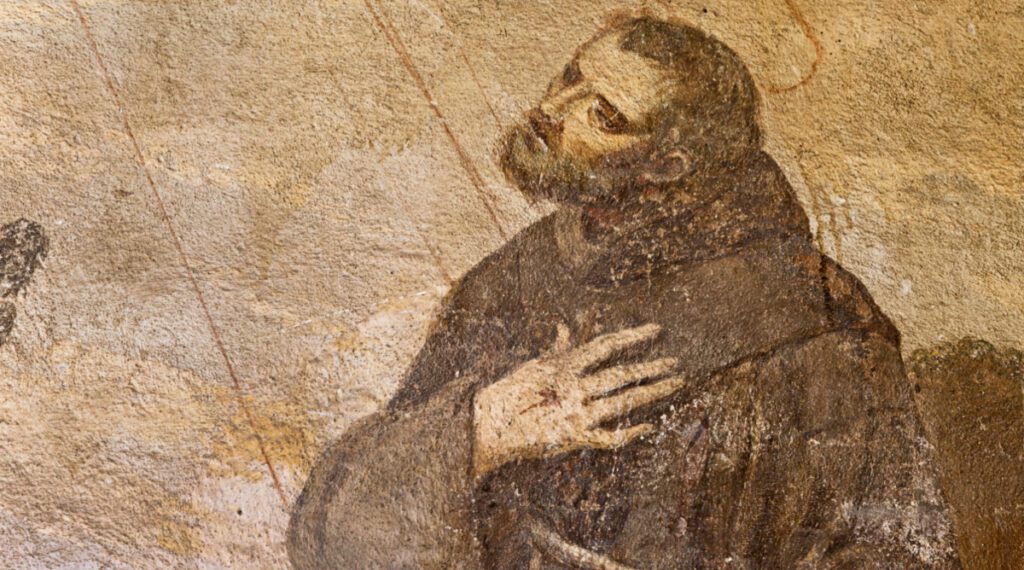There is a famous moment in the life of Francis of Assisi, in which he dramatically renounces his earthly father and claims God as his heavenly Father. Francis gives back to his father not only the money he was demanding but the very clothes off his back.
His furious father, the wealthy cloth merchant Pietro di Bernardone, had pressured the local bishop to call Francis to trial. Pietro demanded that his son pay back what he owed.
Francis had encountered the voice of Jesus calling to him from the cross in the hillside church of San Damiano. Jesus had beckoned: Rebuild my Church, which as you see is falling into ruin. Francis began the rebuilding effort quite literally, gathering or begging for stones to repair the dilapidated building. He also helped himself to a large bolt of his father’s expensive silk, selling it and attempting to give the proceeds to the stunned priest of San Damiano for help in the repair efforts. The priest prudently refused, not wanting to become one of Pietro’s enemies.
Pietro was a greedy man, but his rage had little to do with wealth. It sprang up from the shame and embarrassment that he felt as Francis rejected the rigid role assigned to him.
The famous friar of Assisi was actually named “John” at baptism – a name given by his mother Pica during the long months of Pietro’s absence in France. Upon returning, Pietro met his son and renamed him “Francis” (basically, “Frenchy”) in honor of the affluent country he loved visiting. In what he saw as great benevolence, Pietro planned to pass on his significant wealth to his son Francis, who would make him proud in carrying on the lucrative family business.
Instead, Francis went about begging, mingling with lepers, and sharing his father’s wealth with the poor. Disgusted and embarrassed, Pietro had him beaten and locked in the cellar, hoping he would fall in line. He didn’t. The next time Pietro was away, Francis’ mother released him, and Francis was right back to rebuilding the church of San Damiano – only now he hid himself in a cave to avoid the revenge of his father. That is when his father went to the bishop demanding justice.
The trial was public. Many witnesses heard Francis declare, “From now on I will say freely: ‘Our Father who art in heaven,’ and not ‘My father Pietro di Bernardone.’ Look, not only do I return his money; I give him back all my clothes. I will go to the Lord naked!”
He stripped himself there and then of his father’s robes, revealing the penitential hairshirt he had been wearing underneath.
And here is where I want to pause the story of Francis’ conversion.
Too often, the Saints are seen as superhuman beings who quickly and easily rise to heights that are too lofty for the rest of us. The more steps I take on the road of conversion, the more I realize that the Saints were very normal and sinful human beings like you and me who walked a long and often painful path of conversion.
Most of the people who write the lives of Saints are themselves less than fully converted – so they tend to glamorize or oversimplify the journey of conversion. Sure, we would all love it if our conversion could be one simple and dramatic moment of decision and then living happily ever after. But that is rarely if ever how conversion works! Rather, there are many moments of weakness, faltering, stumbling, and struggling. There are many moments of new discovery and new growth. Consider the life of Peter in the Gospels and the Acts of the Apostles. From early on he loves the Lord and has faith in Him. But he continues to struggle before, during, and after the dying and rising of Jesus. His maturing in the love of Jesus is gradual but significant.
Let’s just suppose that Francis was still – at this moment in his conversion – rather immature and in need of much more conversion. That is actually what the evidence suggests! First, there is Francis’ behavior. He is fearfully hiding in a cave. Plus, his father makes a fair point – it was not okay for Francis to presume that he could just start selling his father’s possessions without permission. There is still no small amount of the entitled party boy in him.
But there is another wonderful detail. For some time, Pietro has been lashing out at Francis with curses. Francis’ solution is to call upon “a lowly, rather simple man” to help him by taking the place of his father. Whenever Pietro would curse Francis, the poor man would speak words of blessing over Francis.
Underlying these details are the fear and shame and insecurity that Francis still felt. Like all human beings, he needed fatherly blessing, and ached for it. He needed to become secure in his identity, to know who he was. That is the greatest gift that fathers in the flesh can give to their children. They can lead them to be secure in the identity that God the Father confers on them – our heavenly Father who alone can fully bless us in the way our hearts desire.
Francis’ greatest example here is not so much his outward poverty as his inward poverty of heart, including his willingness to beg for help. Rather than shaming himself for being emotionally “needy,” he humbly reaches out for words of blessing from a fellow outcast. Through the repeated reminders of another flesh-and-blood human being, Francis’ words to the bishop and the crowd begin taking on flesh.
It sounds nice to say that God is my heavenly Father and that he meets all my needs. But it can be little comfort when my old wounds of shame and insecurity whisper in the shadows that I am not enough, that I am all alone, or that nobody really loves me.
There is a reason why Francis and his followers lived in community as brothers. There is a reason why Jesus taught us to pray to God as Our Father. We cannot connect with the Father without simultaneously connecting with each other as fellow members of the Body of Christ. Only God the Father can fill the void we feel deep in our hearts. But only within healthy community, vulnerably stating needs and receiving care, can we be opened up to receive the Fatherly blessing we need and ache for.
As we become blessed by the Father, then the slow and steady change can begin to happen. Secure in the Father’s love, we can mature in Christ.
Francis’ biographer (Thomas of Celano) delights in the scene of Francis’ nakedness before the bishop and the people: Oh how free is the heart of a man for whom Christ is already enough! True enough, as long as we also remember that Francis was still in the process of claiming that truth and internalizing it – and never without help from others.
Each of us, one way or another, gets pushed into roles. Each of us struggles to discover our true identity, and to be secure in love. In our insecurity, we stay stuck in our sins. We need fellow pilgrims on the journey – those who don’t shame us or fix us, but declare us to be beloved children of God. We absolutely need that repeated reminder so that we can stay secure in the Father’s love and keep walking the difficult road of conversion. Maturity will keep coming – usually quite slowly. Like little children who are growing, we need others to notice our growth, to name it, to celebrate it, and to cheer us on. The Saints in heaven certainly do so, but hopefully also some of our fellow Saints-in-the-making.
Who are the “lowly, rather simple” people in your life who remind you of your identity as a beloved child of God?
____________________________________________________________________________
This post was first published on Abiding in Love and Truth and is reprinted here with permission.
Image courtesy Depositphots.




